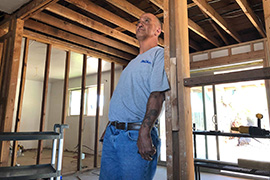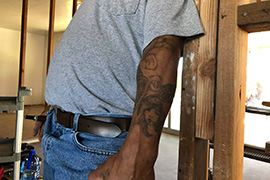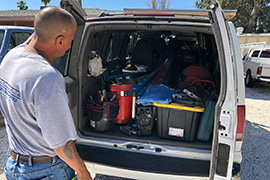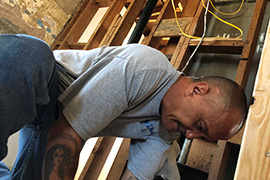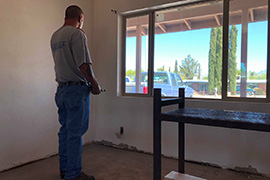- Slug: BC-CNS-Felon Voting,2290
- 5 photos available (thumbnails, captions below)
By DANIEL PERLE
Cronkite News
TUCSON – Michael Romero looks like someone who has worked with his hands for a long time. His muscular forearms make the many tattoos that cover them seem like pop art. Among them are the numbers 93 and 94, etched on the skin of his left forearm to represent two of the five years Romero spent in prison for selling cocaine.
Romero was released in 1998, but his greatest regrets came in the years after. Romero began doing electrical work shortly after his release, but would often blow the money from a day’s work on drugs as soon as he was done.
While in prison, Romero had been approached about converting to Christianity. But it wasn’t until a sweltering July afternoon in 2012, as he came down from a high on synthetic marijuana and saw Jesus silently looking at him, that he embraced religion and gave up drugs for good.
Now, he can work on his goals. Romero is trying to get a contracting license to be an electrician so that he can bring in more business to start paying off the $12,000 he’s racked up in traffic and court fines over the years. In February, he took an important step: He committed to a payment plan in court. In return, a judge restored his right to vote and, Romero said, a good deal of his self-worth.
Romero is one of about 1,100 ex-felons who have regained their right to vote under the guidance of a legal clinic at the University of Arizona, one of the only free legal-aid programs for ex-felons in the state.
At a time of political transition in the country, when Republican dominance in right-leaning states like Arizona is being threatened by changing demographics, efforts in a number of states to more easily and quickly restore the voting rights of ex-felons could help tip the scales. The issue is one of several criminal justice proposals with broad and bipartisan support across the country ahead of the 2020 election.
‘A lot of forward progress’
In Florida, voters passed Measure 4 in November, automatically restoring the voting rights of all felons – except those convicted of murder or felony sex crimes – who complete their sentence, parole and probation. (A recently passed bill would, however, allow voting-rights restorations only after ex-felons fulfill all the financial obligations related to their sentences.) In New York, Gov. Andrew Cuomo, a Democrat, began using his pardon power to restore felons’ voting rights in 2018.
“Since around the generally accepted Civil Rights Movement era, there has been a lot of forward progress rolling back permanent disenfranchisement laws,” said Sean Morales-Doyle, a lawyer who works on voting-rights issues at the Brennan Center for Justice, a nonpartisan public policy institute. “And progress in a number of states is heading toward restoring voting rights to everybody living in the community.”
The most restrictive states do not restore felons’ voting rights until completion of post-sentencing requirements and some additional action. Kentucky and Iowa are the harshest: They permanently disenfranchise all felons. The only option felons have in both states is to apply directly to the governor. Recently, the Iowa House overwhelmingly passed a constitutional amendment to restore felon voting rights, but it was pulled in the Senate before it could be voted on.
In Arizona, felons with one conviction must complete their prison sentence and probation and then pay all the money they owe in fines and restitution before they are allowed to vote again. Those with multiple convictions, like Romero, must fill out a formal request and possibly appear in court so that the judge who sentenced them can approve it. The process not only restores a felon’s voting rights, but also the right to run for public office and serve on a jury.
But there’s not a lot of help for people going through the process. Many aren’t even aware that they can regain their right to vote. Those who are aware often don’t have money to hire a lawyer or know where to go for help.
It took Romero over two years to regain his right to vote. He had heard about the University of Arizona clinic on Election Day in 2016 and went to an information session about it at Pima Community College soon after. Romero was then connected with a law student, who handled his paperwork. He did not have his hearing until this February. It was the clinic’s director, Andy Silverman, a professor emeritus of law at UA, who represented him.
Silverman does not keep meticulous records of the rights restoration cases the clinic has handled; the 1,100 successful cases is an educated estimate. Joel Feinman, a lawyer with the Pima County Public Defender’s Office, said the courts don’t have those numbers either and that his office has only been keeping records on relevant cases for nine months.
“You can find out everything you need to know about an individual case, but when it comes to how many times does ‘x’ happen how many times does ‘y’ happen, that data, sadly, is virtually non-existent,” Feinman said.
Different states, different takes
The Sentencing Project, a criminal justice advocacy group, said in 2016 that 221,170 Arizonans were unable to vote due to felony convictions. That was the ninth-most in the country and the 11th-highest percentage, based on how many people are under the watch of the penal system in each state, and the number of people under post-sentence control by the legal system.
Florida, long a lynchpin of presidential campaigns, had the largest disenfranchised population in the country, at just over 3.3 million, the Sentencing Project reported. That all changed in November when voters passed Measure 4.
According to the National Conference of State Legislatures, just under half of states allow automatic restoration of felons’ voting rights following completion of probation or parole.
Thirteen states and the District of Columbia grant restoration immediately upon a felon’s release from prison. The most-lenient states in the nation are Maine and Vermont, where voting rights are never taken away and prisoners can vote from their cells.
On the opposite end of the spectrum, Arizona has some of the country’s most stringent requirements. The law governing voting rights of one-time felons is known as the “automatic restoration statute,” but the name is deceiving. A person must first complete probation and pay off the fines they owe the court—and paying off anything is difficult for most people who have been recently released from prison.
Feinman said that assumes that court officials “check the right box” to grant someone their automatic restoration.
“Judges do not fill out the paperwork correctly or probation officers do not fill out paperwork correctly,” Feinman said. “I just know that sometimes, a lot of times, with any kind of government or any kind of private industry, the right box doesn’t get checked.”
People with multiple felony convictions have to do all that and then wait at least two years from the time of their release before they can apply to get their rights back. Then, it is up to the judge who sentenced them to grant their request. Court hearings are not always necessary and, according to Yavapai County Superior Court Judge Michael Bluff, will happen only if the state raises an objection — and that, he said, is rare.
“I can only speak for how I handle it, but I think I handle it similar to most judges, which is, of all the things that we do, civil rights, restoring civil rights, is the easiest thing we do,” Bluff said.
Bluff was a member of the Task Force on Fair Justice for All, a criminal-justice reform initiative of the Arizona Supreme Court that called foro several changes to the process of applying for voting-rights restoration. One is to require that judges inform people at sentencing that they can apply to have their voting rights restored after release and to list the options available to them. Another created a standard form to be used statewide for multiple felons seeking a rights restoration. Previously, each county had its own form.
Some of those recommendations were included in HB 2080, such as adding more transparency to the process and requiring judges to write down their reasoning if they deny someone a civil rights restoration. The bill, sponsored by Arizona House Majority Leader Rep. John Allen, R-Phoenix, would also remove the fine-payment requirement for first-time offenders. It was passed last month and signed April 30 by Gov. Doug Ducey.
Two other bills, both introduced by Democrats, would include automatic restoration for all felons upon completion of parole, but they have been stuck in various House committees.
Meanwhile, the work at Silverman’s clinic continues. Since 2006, information about the clinic has spread mostly through word of mouth.
Paperwork, and more paperwork
Silverman said that help restoring voting rights is rarely the only thing ex-felons are looking for when they go there. Most, he said, also come looking for ways to downgrade their convictions. In Arizona, the only legal way to do that, for misdemeanor or felony offenders, is to get a judge to approve a “set aside.”
Feinman said that set-asides are “legally meaningless,” because they do not expunge a conviction from someone’s record and do not make it impossible for a potential employer to find such conviction. They do make it harder, though, because employers usually don’t know the difference between a set-aside and an expungement.
Once Silverman accepts someone’s case, he assigns them to a law student. The student and ex-felon may have an introductory meeting, with general questions about what services the felon needs. Other times, the felon’s needs are already known and that first meeting is an opportunity to gather and review the necessary documents to get the legal case going.
That’s how it was for Michelle Keller, who was assisted by Silverman’s clinic a few years ago. She said she brought enough documents to that first meeting to “fill one of the big tables where the mafia comes together.” The documents had been kept by her mother in four or five legal boxes, waiting for the day they would be of use
Keller had three stints in prison, in the 1990s and 2000s, all for drug-related charges. After her third release, she was determined to get her life back on track and heard about Silverman’s clinic from a co-worker.
Her first meeting was in 2009, with a law student who then moved out of state. Other students came along to help, and her appeal reached the sentencing judge in 2009. It wasn’t until 2012 that the judge restored her voting rights, but refused to set aside her last conviction because Keller still owes over $500 in fines from it.
Romero’s debt to the court is more than 20 times that amount.
‘A snowball’s chance…’
He went to prison in 1993 after being convicted on three counts of transporting and selling cocaine. After his release and his religious awakening, Romero wanted to vote.
On Election Day 2016, he got on a bus to downtown Tucson to see if he could vote, even though he suspected there was not “a snowball’s chance in hell” that he’d be able to. He knew there was some sort of stigma attached to voting for felons, but he also knew other ex-felons who had been able to vote again.
In fact, Romero was turned away that day. But on the bus ride over, he heard a man talking about Silverman’s clinic, and that services there were free. A few weeks later, Romero attended an information session at Pima Community College’s West Campus, hosted by Silverman, who set Romero up for a meeting with one of his students.
Romero knew it would take time, but didn’t think that meant waiting for two years.
“You feel worthy, whether you use those rights or not, but knowing you have them makes a world of difference,” Romero said.
Romero has not registered to vote, but said he plans to do so when he reports next month for jury duty – another right that was restored with his right to vote.
On a late April Wednesday in Tucson, Romero is making changes to the circuits of a house with the guts torn out off of Golf Links Road in Tucson. His work van bears a bumper sticker that says, “The best things in life aren’t things.” Inside are pipe benders, ladders and toolboxes with different types of wires.
Though the judge restored his voting rights, he did not grant a set-aside because of Romero’s unpaid court fees and traffic fines. That has Romero in a hurry to get a contracting license for his electrician’s business so he can start making regular payments and finally be able to say he has fully paid his debt to society.
Romero had to take the first phase of the contracting license test, on fiscal and financial terms, a few times before he passed. His next step will be to take the technical part of the test, on the ins and outs of being an electrician.
He has also been working at mending fences at home.
He spent the week before he got to work on the Golf Links house hanging out with one of his three daughters, Jazzmin.
Romero says that a lot of their conversations these days revolve around him explaining that it is not his daughters’ fault he wasn’t in their life. It’s his fault.
When they aren’t discussing Romero’s troubled past, Jazzmin will ask him for dating advice, though Romero is hesitant to offer anything that might point her in the wrong direction.
He said, “You don’t want to do something and then later down the road she’ll regret mistakes she made as a teenager trying to be an adult when she should have been a kid.”
For more stories from Cronkite News, visit cronkitenews.azpbs.org.
^__=
Web links:
_ Sentencing Project data: https://www.sentencingproject.org/publications/6-million-lost-voters-state-level-estimates-felony-disenfranchisement-2016/
_ Florida Measure 4: https://dos.elections.myflorida.com/initiatives/fulltext/pdf/64388-1.pdf
_ Florida SB 7066: https://www.flsenate.gov/Session/Bill/2019/7066/BillText/er/PDF
_ Arizona HB 2080: https://www.azleg.gov/legtext/54leg/1R/laws/0149.htm
_ Civil Rights Restoration Clinic: https://law.arizona.edu/civil-rights-restoration-clinic
_ Arizona “automatic restoration” law: https://www.azleg.gov/ars/13/00912.htm
^__=
Years after getting out of prison, Michael Romero is getting his life straight, getting his business on track and looking forward to voting again – a right it took him years to regain. (Photo by Daniel Perle/Cronkite News)
The tattoo that covers Michael Romero’s left forearm features the numbers 93 and 94, two of the five years he spent in prison for selling cocaine before getting out and getting his life together. (Photo by Daniel Perle/Cronkite News)
Michael Romero eyes the tools of his electrical trade, packed in the back of his truck, while on a job in Tucson. (Photo by Daniel Perle/Cronkite News)
Michael Romero began doing electrical work soon after his release from prison in 1998, but faced continued setbacks because of his struggles at the time with drugs. (Photo by Daniel Perle/Cronkite News)
Michael Romero works on a house in Tucson. After time in prison and battling drugs, he recently won back the right to vote. Having that right, he said, “makes you feel worthy.” (Photo by Daniel Perle/Cronkite News)
